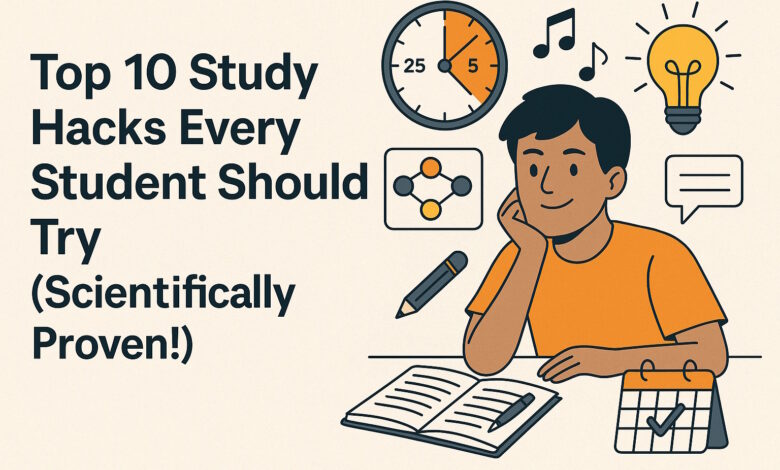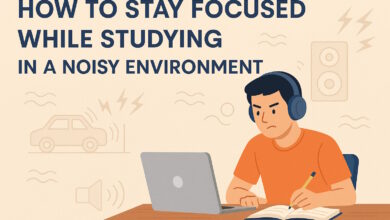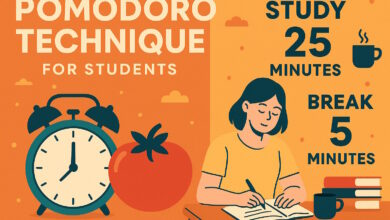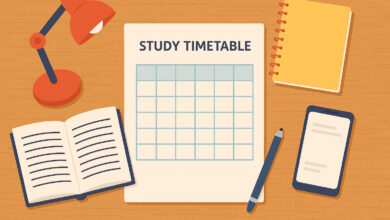Top 10 Study Hacks Every Student Should Try (Scientifically Proven!)

Whether you’re a school student, college-going youth, or preparing for tough government exams like UPSC, SSC, NEET, or JEE – studying smarter is the key to success. It’s not about how many hours you sit with your books, but how effectively you use that time.
In this article, we’ll share the Top 10 study hacks that are scientifically proven and used by toppers across the world. These tricks will help you retain more, stay focused, and most importantly, avoid burnout.
Let’s get started!
1. 🧠 The Pomodoro Technique – Study in Short Bursts
Sitting for 3-4 hours straight is not the best way to study. Your brain loses focus after some time. The Pomodoro Technique suggests:
-
Study for 25 minutes
-
Take a 5-minute break
-
Repeat the cycle 4 times
-
Then take a longer break of 15–30 minutes
This method helps you stay focused without feeling tired.
Example: Use a timer app like Pomofocus or even a simple phone timer. Study for 25 minutes, then walk around for 5 minutes. You’ll be surprised how fresh your mind feels.
2. ✍️ Active Recall – Don’t Just Read, Test Yourself
Reading your notes again and again is not effective. Instead, close your book and try to recall what you just studied. This is called active recall, and it is proven to strengthen memory.
Example: After reading a chapter, write down all you remember without looking. Then check what you missed and revise that.
This technique forces your brain to actively work and store information longer.
3. 🔁 Spaced Repetition – Revise at Proper Gaps
Have you ever studied a topic and forgotten it within days? That’s because your brain needs to see the information multiple times, at spaced intervals.
The method of spaced repetition helps beat the “forgetting curve.”
Ideal revision schedule:
-
Day 1: Study the topic
-
Day 3: First revision
-
Day 7: Second revision
-
Day 14: Final revision
Tools: Use flashcards or apps like Anki to set reminders for spaced review.
4. 📓 Feynman Technique – Teach to Learn
One of the best ways to know if you’ve truly understood a topic is by teaching it to someone else or explaining it in your own words.
This method, known as the Feynman Technique, helps identify gaps in your understanding.
Try this:
-
Read a topic
-
Close the book and explain it aloud (as if teaching a child)
-
If you struggle, you need to go back and learn it again
You can even record yourself explaining and listen to it later!
5. 🗺️ Use Mind Maps & Diagrams
Visual learners remember better when they see the information in a diagram or flowchart.
Instead of paragraphs, try converting content into:
-
Mind maps
-
Flowcharts
-
Tables
-
Diagrams
Example: Biology concepts, historical timelines, or physics formulas can be turned into easy-to-remember visual notes.
This makes revision faster and more interesting.
6. 🎧 Use Lo-Fi Music or Nature Sounds
Many students find it hard to concentrate in silence. Soft background music, like Lo-fi beats or rain sounds, can help you relax and focus better.
Important: Don’t use music with lyrics – that will distract you.
Where to find: YouTube (Lo-fi girl), Spotify, or apps like Noisli.
7. 🔕 Eliminate Distractions – Focus is the Key
Your phone is your biggest enemy while studying. Instagram reels, YouTube shorts, and WhatsApp messages kill your productivity.
What to do:
-
Keep your phone in another room while studying
-
Use apps like Focus Mode or Digital Wellbeing
-
Block distracting websites
Even 1 hour of focused study is better than 4 hours of distracted reading.
8. 🕐 Study at Your Best Time (Find Your Peak Hours)
Everyone has different energy levels. Some students are active in the morning, others at night. You need to find your peak concentration time.
Try this: Track your energy and focus levels for 1 week at different times (morning, afternoon, night).
Once you find your best hours, schedule difficult subjects during that time.
9. 🛏️ Sleep Well – Your Brain Needs Rest
Don’t think sacrificing sleep will help you score more. Lack of sleep affects memory, focus, and mood.
Science says: Your brain stores all information properly while you sleep. So, sleep is like a “save button” for your memory.
Tips for better sleep:
-
Avoid screens 1 hour before bed
-
Sleep for at least 7–8 hours
-
Don’t study in bed – it confuses your brain
10. 📝 Solve Mock Tests & PYQs
You can study all you want, but unless you practice questions, you won’t perform well in exams.
Why it’s important:
-
Helps manage time during real exams
-
Reduces fear and anxiety
-
Shows your weak areas
What to do:
-
Solve previous year questions (PYQs)
-
Take weekly mock tests
-
Analyse your mistakes
This will train your mind for exam conditions.
💡 Combine Multiple Hacks for Best Results
These techniques work best when used together. For example:
✅ Use Pomodoro while doing Active Recall
✅ Revise using Spaced Repetition and Mind Maps
✅ Practice questions using Mock Tests during your peak hours
Build a system that suits your learning style.
🙋♂️ Frequently Asked Questions (FAQs)
Q1. Which study hack is best for fast revision?
Spaced repetition + Active recall work great for revising quickly and retaining more.
Q2. Can I use the Pomodoro technique for long study hours?
Yes! After every 4 Pomodoro sessions, take a longer break. It helps prevent burnout.
Q3. Does music really help while studying?
For many students, soft instrumental or Lo-fi music improves focus. But avoid songs with lyrics.
Q4. How many hours should I study daily?
It depends on your goal. Focus on quality over quantity. Even 4–6 hours of focused study is better than 10 distracted hours.
Q5. I forget what I study. What should I do?
Use Active Recall and Spaced Repetition. These are scientifically proven to improve memory retention.
✨ Final Thoughts
Studying doesn’t have to be boring or stressful. With the right techniques, you can study smarter, save time, and still top your exams. These 10 hacks are used by toppers around the world — now it’s your turn.
Start with 1 or 2 hacks today, track your progress, and build your own winning study routine.
Remember, success is not about working harder than everyone else — it’s about working smarter than yesterday.



